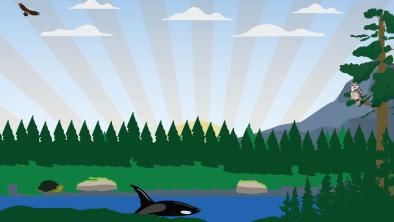Environmental groups take their fights to court
Vancouver Sun
A series of lawsuits, many of them launched by Ecojustice, aims to compel governments to enforce their own laws
Devon Page, executive director of Ecojustice, says U.S. environmental groups have more tools at their disposal because of tougher laws including the Endangered Species Act, Clean Air Act and Clean Water Act.
VANCOUVER -- A recent flurry of lawsuits by environmentalists aims to force governments to adhere to their own laws, the Vancouver-based executive director of Ecojustice said Thursday.
Ecojustice, often in collaboration with other groups, has been at the forefront of the litigation since its inception in 1990.
In part, that is due to a policy decision by the group to focus on litigation — “our bread and butter” — instead of public education and law reform, Devon Page said. But the lawsuits are all a response to government action, he added.
On Wednesday, Ecojustice — representing a coalition of environmental groups — went to Federal Court in Vancouver to argue that the federal environment and fisheries ministers have “unlawfully” delayed final recovery strategies for four species well past mandatory deadlines. The species are the Pacific humpback whale, Nechako white sturgeon, marbled murrelet and southern mountain caribou. The case was filed in 2012.
Since that year, Page noted, the Conservative government has watered down key federal legislation related to fish protection and environmental assessments, setting the bar high for lawsuits based on environmental grounds.
Practically, launching a successful suit is harder than it’s ever been, he said in an interview.
Yet the nature of environmental issues — and public awareness of those issues — has never been greater, resulting in continued strong donations to Ecojustice during fragile economic times, he added.
The group has been involved in a total of nine separate legal actions in B.C. alone since 2009, ranging from species at risk and logging practices to aquaculture and fracking in the oil-and-gas sector. Five of those actions have been in the courts in the past year.
“In B.C., there’s much greater awareness of what the environmental issues are,” Page said. “It’s inevitable we’ll always have more cases in B.C.”
Most environmental challenges seek a judicial review of the legality of a federal action, which can be difficult because the courts often defer to decision makers to interpret technical aspects of legislation, said Mark Haddock, a senior instructor of environmental law at the University of Victoria and a member of the Wilderness Committee board.
However, the federal Species At Risk Act (SARA, which came into force in 2003) requires the federal government to take specific action such as developing species recovery plans within certain time periods.
And that’s been a big key to Ecojustice’s success. “The more specific the legislation, the less room there is for argument on whether the government complied with the law,” Haddock said.
Ecojustice has a $4.8-million budget in the 2013-14 fiscal year, up from $3.8 million in 2008-09. The portion from U.S. individuals and charitable foundations during that time amounted to 18 per cent and 20 per cent, respectively.
“We try to use court cases to address the most significant threats to the environment, the greatest opportunities for environmental protection,” Page said. “We don’t choose cases based on funder priorities.”
Ecojustice provides legal counsel for free, requiring clients such as environmental groups to pay for any court costs, including travel and photocopying costs.
“No lawyer guarantees wins,” he said. “But a lot of our donors understand the value of scrutiny by the courts, win or lose.”
To maintain their charitable status, environmental groups must ensure that no more than 10 per cent of their resources are devoted to political activity. Ecojustice is not considered political in that sense because it is simply trying to force the government to obey its own laws, Page said. “Forcing the federal government to follow its own laws is considered a charitable activity in its roots ...”
He said it’s easier for environmental groups in the U.S. because they have more pieces of legislation on which to base legal action, including the Endangered Species Act, Clean Air Act, and Clean Water Act.
Other Ecojustice cases in B.C.:
• In 2009, the Federal Court admonished Ottawa for failing to properly identify the habitat of the Nooksack dace, an endangered minnow found in just four freshwater streams in Metro Vancouver.
• In 2009, Ecojustice lost an injunction bid to protect the marine environment from seismic testing.
• In 2010, the Federal Court ruled that Ottawa had not done enough to protect the critical habitat of killer whales related to issues of salmon availability, environmental contamination and noise pollution from marine traffic.
• In 2011, the B.C. Supreme Court dismissed a multi-million-dollar damage claim against a small conservation group and one of its members in Langley who sought to protect fish habitat. Ecojustice acted on their behalf, calling the decision a victory for free speech.
• In 2011, the Federal Court ordered federal fisheries to pay Ecojustice $80,000 in court costs after the department was found to be “unjustifiably evasive and obstructive” in the killer whale case.
• In 2012, the Federal Court of Appeal upheld the 2010 decision, saying that the trial court was correct in finding that the fisheries government did not take adequate measures to protect killer whale habitat.
• In 2013, action launched in Federal Court against the federal Minister of Fisheries and Oceans and Marine Harvest Canada challenging an aquaculture licence on BC’s coast.
• In 2013, action launched in B.C. Supreme Court against the BC Oil and Gas commission challenging water permits for hydraulic fracturing.
• In 2013, action launched against the B.C. government for failing to take steps under the Forest and Range Practices Act to make logging companies allow for conservation of coastal Douglas fir forests. The case is back in B.C. Supreme Court later this month.
• In 2013, the B.C. Supreme Court ruled against an Ecojustice bid to force the Holmes hydro project near McBride to undergo an environmental assessment. Ecojustice argued that 10 linked Hydro plants will together generate 85 megawatts of electricity. But because no individual plant would generate more than 50 megawatts — the threshold for triggering an environmental assessment — none were ordered.
Outside of B.C., Ecojustice has also successfully gone to court in recent years over the federal government not meeting its SARA obligations related to the piping plover in Ontario, and the sage grouse in Alberta.
In Wednesday’s case, the court is being asked to declare the delays in species recovery strategies “unlawful” and order those recovery plans.
Ecojustice is representing the Wilderness Committee, Sierra Club, David Suzuki Foundation, Greenpeace and Wildsight.
At the time the lawsuit was filed in late 2012, the final recovery strategies for these four species were between four and six years overdue.
All four species named in the court action are affected by oil and gas expansion plans in B.C. and Alberta, in particular the Northern Gateway pipeline proposal, the groups said.
Last fall, after the federal review panel weighing the Northern Gateway stopped hearing evidence, Fisheries Minister Gail Shea published a final recovery strategy for the Pacific humpback whale.
In December, the ministry published a draft recovery strategy for the Nechako white sturgeon and the draft plan for the murrelet was published on Tuesday, the eve of the hearing.
In written submissions, government lawyers said Ottawa does not dispute that the timelines set out in the act are legally required to be met, but they argued that with the publication of the final and draft recovery plans there is no remaining dispute.
Photo: Ecojustice's Devon Page speaks to reporters outside the courthouse (Kimberly Shearon)


